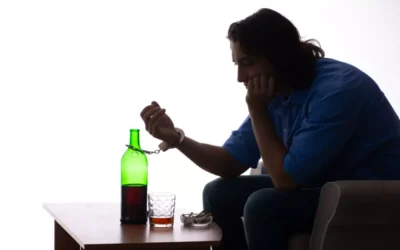Timeline of Alcohol Withdrawal Symptoms
Content
Alcohol detox happens when the body removes any remaining alcohol from the system. The amount of time that it takes for alcohol to completely leave your bloodstream depends on multiple factors, including age, gender, health, genetic makeup and history of alcohol use. According to the National Library of Medicine, alcohol withdrawal typically begins within eight hours after the last drink, but it can also take a few days to begin in some cases. The symptoms usually peak within 24 to 72 hours, but some can continue for several weeks. Alcohol detection tests can still detect alcohol in your urine, saliva and hair after it has been completely eliminated from your bloodstream. As such, the term « detoxification » may be somewhat of a misnomer since the process need not refer exclusively to the removal of toxic substances from the body.

This may be helpful for combating withdrawal symptoms such as stomach upset and feelings of fatigue. Once alcohol is fully cleared from an individual’s system, they can begin to address the issues that fuel the addiction. And, ultimately, regain their health, freedom, and genuine enjoyment of life. Moderate withdrawal includes stage 1 symptoms, sweating, rapid heart rate, lower fever, and slight confusion. Mild withdrawal consists of less severe symptoms such as headaches, anxiety, irritability, and insomnia.
Risks Of Alcohol Withdrawal
The medications prescribed by our physicians help normalize the chemistry of the brain while blocking the negative effects of alcohol. Controlled medications also help to reduce physiological cravings and normalize bodily functions. Alcohol withdrawal symptoms can range from mild to severe depending on the level of alcohol addiction. However, knowing what alcohol withdrawal symptoms are, in advance, helps patients to cope with them when they do arise. According to WebMD, Alcohol withdrawal symptoms typically begin within 6 to 72 hours after the last time alcohol was consumed.

By the time you’ve completed your first week of detox, many of the withdrawal symptoms will begin to taper off. While some symptoms may persist for a few weeks, most of them https://ecosoberhouse.com/ are minor and can be treated with medication. When alcohol levels in the body drop suddenly, the nervous system continues to operate in this elevated state for some time.
Alcohol Withdrawal Timeline
A significant number of alcoholics do not respond to treatment beyond detoxification. Many alcoholics repeat this cycle a few times and eventually enter long-term rehabilitation treatment. Some, however, continue to repeat this cycle as “detoxloopers” and exhibit the so-called “revolving-door” phenomenon. Having a strong support system, through either family or support groups (such as Alcoholics Anonymous), can make a huge difference in relapse prevention.
Patients for whom outpatient detoxification is not appropriate become candidates for inpatient detoxification. In-patient settings offer the advantages of constant medical care and supervision provided by a professional staff and the easy availability of treatment for serious complications. In addition, such settings prevent patient access to alcohol and offer separation from the substance-using environment. Yes, in many cases insurance (including Medicare) will cover medically-assisted alcohol detox. You should speak with your insurance provider to find out what exactly is covered when it comes to treatment for alcohol use disorder, including medical detox services. Most people will experience alcohol withdrawal symptoms in the first 6-12 hours following their last drink.
Medications to Treat Alcohol Withdrawal
Mild symptoms may begin as early as six hours after the last drink for some people. The time it takes withdrawal to start depends on factors like age, gender, genetics, overall health and alcohol use history. Alcohol withdrawal can begin within hours of ending a drinking session.
- The primary disadvantage of inpatient detoxification is its relatively higher cost compared with outpatient alternatives.
- But stopping drinking suddenly can also result in various side effects, some potentially harmful.
- However, it may be delayed for more than a week for some individuals.
- Using alcohol and marijuana in combination increases your risk of experiencing uncomfortable side effects due to increased absorption of THC.
- We may receive advertising fees if you follow links to promoted online therapy websites.
People who suffer from alcoholism often find that the first step in their road to recovery is detoxification, or detox. Detox is the elimination of alcohol from the body after the body has adjusted itself chemically to having the substance regularly. Withdrawal symptoms can vary from mild to severe depending on various factors, such as how much the individual drank, how often, and if they have any co-occurring disorders. While this alone doesn’t guarantee life-long abstinence, alcohol detox can provide the first step in living cleanly when followed by rehabilitation or therapy. Most outpatients experience greater social support than inpatients, with the exception of outpatients in especially adverse family circumstances or job situations.
In one study, about one-half of all patients randomly assigned to either inpatient or outpatient detoxification remained abstinent 6 months later, irrespective of the program to which they were assigned. In addition, there was no significant difference in the percentage of each group that enrolled in long-term treatment following detoxification (Hayashida et al. 1989). However, one-third to one-half of patients who enter detoxification treatment, whether as inpatients or outpatients, return to alcohol abuse within 6 months (Hayashida et al. 1989). Patients receiving outpatient detoxification treatment usually are expected to travel to a hospital or other treatment facility daily (excluding weekends) for treatment sessions.
- This is so your doctor can monitor your condition and manage any complications.
- Symptoms of alcohol withdrawal typically improve within five days, though some patients may have prolonged symptoms lasting weeks, however the severe symptoms listed above do not last for weeks.
- Status Epilepticus is an extremely severe form of seizure, which can cause a loss of consciousness, muscle stiffening, loss of bladder control, and convulsions.
- One advantage of in-patient detox is that you will be away from your usual drinking triggers and therefore be less likely to pick up a drink to stop symptoms when they begin.
In fact, an estimated one-third of people who receive treatment for alcohol issues are sober one year later, according to the National Institute on Alcohol Abuse and Alcoholism. As with other addictions, alcohol dependency can negatively affect a person’s life. Jessica graduated from the University of South Florida (USF) with an English degree and combines her writing expertise and passion for helping others to deliver reliable information to those impacted by addiction. Informed by her personal journey to recovery and support of loved ones in sobriety, Jessica’s empathetic and authentic approach resonates deeply with the Addiction Help community. The brain’s neurotransmitters are heavily suppressed by alcohol consumption.
Mild Withdrawal Symptoms
Many people are afraid that if they quit drinking, withdrawal symptoms could be difficult to manage, or even dangerous. Knowing what helps with alcohol withdrawal can make the experience less uncomfortable Alcohol Detox and risky. Additionally, you or your loved one may already be enrolled in an alcohol rehabilitation program (inpatient or outpatient), and the detox process was just the first step in your journey.



